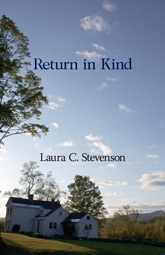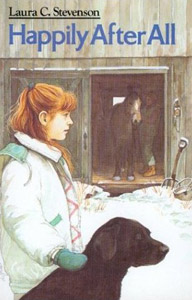A New Series: One Minute Reviews of
Books by Vermont Authors
Laura's column "One Minute Reviews" has appeared bi-weekly in Wilmington, Vermont's Deerfield Valley News since 2015. In April 2018, she found that no Vermont periodical consistently reviews all commercially published fiction and non-fiction by Vermont authors, so she started a series to fill that void. Published reviews from that series and some earlier reviews of local authors are listed with links to a scan of the printed copy. Reviews still in queue are listed without links until they appear in print.
The books reviewed in this series are available through Wilmington's Pettee Memorial Library, the Whitingham Free Public Library, and locally owned Bartleby's Books in Wilmington.
Deerfield Valley News, 12/30/2021
Ecological Legacies and a Feminist Myth
Megan Mayhew Bergman, How Strange a Season. Scribner, 2022
How Strange a Season is a collection of seven short stories and a novella, several of them set in the South, and all but one of them concerning women coming to terms with problems they have inherited from their families. In a few cases, their legacies are physical. The grandmother of the central figure in “Inheritance,” for example, has left her a glass house that is perched on a California cliff. The woman in “Heirloom” has had to figure out how to make a living on the Arizona ranch she has inherited from her family. “Peaches, 1979” concerns a woman who is responsible not only for running the family’s peach orchard after her father’s death, but for dealing with the irresponsible family as well. The novella, “Indigo Run,” concerns a once-prosperous South Carolina plantation founded in 1752 that has deteriorated, both physically and morally, since the Civil War, until at last, in the 1950s, the woman who inherits it ponders its fate. The swimmer in “Wife Days” has, it materializes, allowed her husband to destroy her grandmother’s house in a peculiar revenge for a trip to Europe.
Interwoven with the legacies of the stories is Legacy in a larger, ecological sense. The glass house in California barely survives a mud slide. The women trying to make a living out of the Arizona ranch and the southern peach farm face severe water shortage. The crops in “Indigo Run” no longer grow, and the river is filled with mud. In an amusing story in which legacy plays no part, a graduate student’s project takes her to North Carolina, where she attempts to convince natives to eat Lionfish, an invasive species that are destroying reef ecosystems. The beautiful interweaving of ecological and familial legacies gives the stories a depth beyond their perceptive portrayals of women whose lives are controlled at least in part by circumstances over which they have little control.
Collections of stories largely reflecting on the same problem tend to lack long-term development, even when they are as skillfully written as these. One solution for readers is not to read the stories and novella in a sitting or two; works of these lengths are most effective in short takes. In How Strange a Season, there is another alternative: skipping to “Night Hag,” the mythical story with which the collection concludes. Suddenly, the monotone of the earlier stories disappears in a myth about the “cousin of Eve,” born from a fish egg, lengthened into a woman’s shape, and kept a forest secret, hidden in vine-choked trees. Desired by men, she plans never to come down—at least, until she has found the true love that stories promise. The false promise of stories shows itself when she willingly lets herself be pulled from the tree; the “lover” who has been so enticing rapes her, then disappears. Furious, cheated, she becomes at once a human and an ecological terror, and her own story seethes with anger. The change in voice from the languid unhappiness of the other stories to one fire-breathing revenge, though seemingly at odds with the rest of the collection, actually sums up the hidden anger of the stories that precede it. “Night Hag” is one of Bergman’s finest stories, one that will remain with its readers long after the book is closed.


